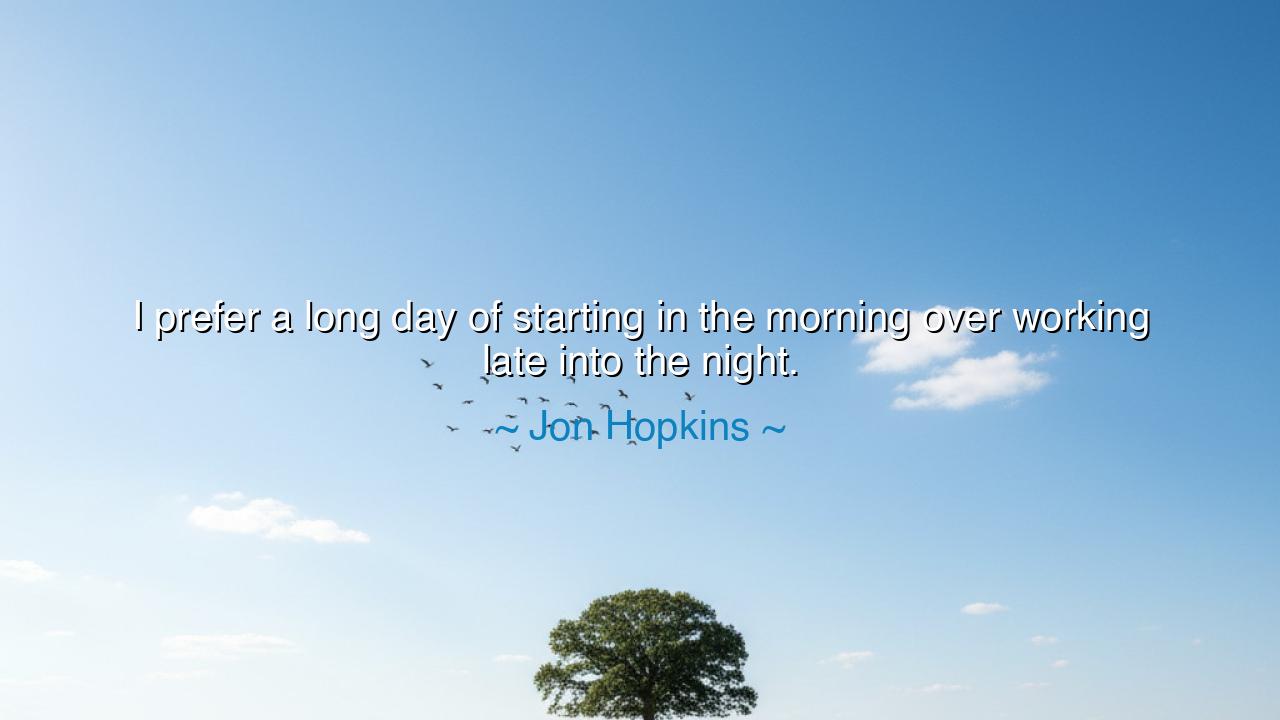
I prefer a long day of starting in the morning over working late






In the unfolding journey of life, there are many roads we may take, many choices that shape our days and nights. Jon Hopkins, the celebrated musician and producer, reflects on a simple but powerful truth when he says, "I prefer a long day of starting in the morning over working late into the night." These words speak to the ancient wisdom of balance, of the natural rhythm that governs our lives. In choosing to begin his work early, Hopkins embraces the peaceful energy of the morning, setting a tone of clarity and purpose that extends throughout the day. His words suggest that the quality of one’s life is not defined by how late one works, but by how mindfully and fully one engages with the hours that are given.
In the ancient world, the greatest minds and warriors understood that the first moments of the day held a unique power. The Egyptians, known for their wisdom and alignment with the cosmos, often viewed the dawn as sacred, a time when the world was born anew. The sun rising was a symbol of renewal, the moment when both the gods and men began their work with clarity and intent. Hopkins’ preference for a long day that begins in the morning echoes this ancient reverence for the dawn, for it is in the stillness of the morning that one can find true focus, untainted by the distractions that the night often brings. In this quiet time, the spirit is aligned with the natural order, and the mind is free to engage fully in the task at hand.
Consider the example of the legendary Spartan warriors, whose days began at dawn with rigorous physical training and discipline. The Spartans understood the importance of starting early, for their strength lay not in the excess of energy at the end of the day, but in the consistency and discipline with which they began their work. Their days were long, filled with training, reflection, and readiness for whatever challenges awaited them. The warrior who rises early, whose focus is sharp and clear, is the one who prevails—not just in battle, but in all aspects of life. Hopkins’ words mirror the Spartan ethos, where the beginning of the day is a time for mastery, focus, and intentionality, not for rushing or lingering in the distractions of the evening.
The wisdom of beginning early over working late also speaks to the importance of the body's natural rhythms. The ancient Romans, though famed for their engineering marvels and strategic genius, also revered the balance of rest and work. Seneca, the Stoic philosopher, taught that the pursuit of virtue required not only dedication and effort but a respect for the body’s needs. He understood that the best work was not done when the body was exhausted or deprived of rest, but when it was fresh and clear. Hopkins’ preference for the morning reflects this ancient belief—by starting early, we honor the natural rhythms of the body, engaging with the world when we are at our most capable and energetic.
Hopkins’ approach also reminds us of the power of the morning as a time of peaceful reflection and preparation. The ancient Buddhists often began their day with meditation, using the quiet hours of the morning to clear their minds and align their spirits. In the I Ching, the ancient Chinese text of wisdom, the idea of preparation and inner balance is central—one must approach each task with clarity, free from the clutter and fatigue of the evening. Hopkins, like the wise monks and philosophers of the past, recognizes that the best work begins with inner calm and clarity, and that starting the day with this peace brings greater fulfillment and success in the hours to follow.
The lesson in Hopkins’ quote is one of understanding the balance between effort and rest, between action and reflection. It teaches us that our lives are not to be measured by how much we work or how late we stay up, but by how fully we engage with the time we are given. The morning, like the dawn of a new day, is a time to start fresh, to set the tone for what is to come. The work that begins with focus, energy, and clarity will yield greater results than the frantic scrambling of the night. Hopkins’ preference for an early start serves as a reminder that the beginning of the day is the foundation of all that follows—a foundation built on intentionality, clarity, and purpose.
So, let us take this wisdom into our own lives. We may not be warriors or philosophers, but like them, we are called to live with discipline and focus. Let us embrace the stillness of the morning, honoring the energy of the new day and using it to set our intentions. Let us remember that the true measure of our work is not in how late we stay up or how much we can cram into the day, but in how we begin each moment—with clarity, purpose, and alignment with the rhythms of nature. By starting early, we give ourselves the gift of a long, fulfilling day, filled with the richness of true effort and engagement.






AAdministratorAdministrator
Welcome, honored guests. Please leave a comment, we will respond soon